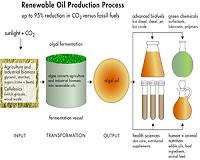 |
Sao Paulo, Brazil (SPX) Nov 30, 2010 Sao Paulo, Brazil - with its many millions of inhabitants - is taking another step towards sustainable development. The city's mayor, Gilberto Kassab, announced yesterday (25 November) that Scania ethanol buses will become part of the public transport system. The first 50 buses will go into service in May 2011. "The use of ethanol as a vehicle fuel is the best example of what can be done here and now in sustainable development work. Ethanol accounts for 90 percent of the renewable fuel available in the world. By delivering ethanol buses to Sao Paulo, Scania is helping to strengthen Brazil's leading position in reducing climate impact," says Melker Jernberg, Senior Vice President and head of Scania Buses and Coaches. There are a total of some 15,000 public transport buses in Sao Paulo. One official environmental target is that all such buses should operate on renewable fuels by no later than 2018. "Since the supply of biogas is limited, ethanol will be the dominant biofuel. This means there is very large potential for Scania, which is the only manufacturer of heavy-duty buses with ethanol-powered engines," says Wilson Pereira, head of sales of Buses and Coaches at Scania Brasil. Scania is receiving the ethanol bus order after a few years of field trials in Sao Paulo, coordinated by experts with links to the University of Sao Paulo and with participation by ethanol suppliers, bus bodybuilders, operators and Sao Paulo transport authorities. "The initiative has shown that ethanol-powered buses are ready to operate in Brazil, immediately helping to replace the use of fossil fuel with a renewable source and offering a tremendous advantage in emission reduction," says Wilson Pereira. The new Scania buses will operate in Sao Paulo, where transport authority SPTrans is aiming at an initial fleet of 200 ethanol buses. All buses will be manufactured in Brazil. Chassis assembly will take place at Scania's production unit in Sao Paulo and bodywork will be done by a local company. Brazil is the world's largest producer of ethanol fuel and has long experience in producing and using biofuels in a sustainable way. The ethanol is made from cane sugar and has been used since the 1980s as fuel for cars and other vehicles with petrol-fuelled engines. Successful public policies on land management have allowed a steadily increasing output of bioenergy and other agricultural products, while deforestation rates in the Amazon are continuously decreasing. Scania started to develop ethanol buses in the mid-1980s in close cooperation with the Stockholm regional public transport company Storstockholms Lokaltrafik (SL). Two decades of regular full-scale operation in tough urban conditions show that ethanol-power is a fully proven bus technology. There are no operational drawbacks as long as the scheduled maintenance requirements are followed. The buses are completely standard, using regular Scania components.
Share This Article With Planet Earth
Related Links Scania Bio Fuel Technology and Application News
 Biofuels Digest Readers Rank Strongest Drivers For Biofuel Industry In 2011
Biofuels Digest Readers Rank Strongest Drivers For Biofuel Industry In 2011Washington DC (SPX) Nov 30, 2010 The U.S. military's interest in secure domestic sources of renewable biofuels and biofuels producers' search for commercial value streams in renewable chemicals and biobased products will be the top trends for 2011, according to respondents of the BIO/Biofuels Digest "11 Hot Trends for 2011" poll. The Biotechnology Industry Organization (BIO) and Biofuels Digest have jointly released the r ... read more |
|
| The content herein, unless otherwise known to be public domain, are Copyright 1995-2010 - SpaceDaily. AFP and UPI Wire Stories are copyright Agence France-Presse and United Press International. ESA Portal Reports are copyright European Space Agency. All NASA sourced material is public domain. Additional copyrights may apply in whole or part to other bona fide parties. Advertising does not imply endorsement,agreement or approval of any opinions, statements or information provided by SpaceDaily on any Web page published or hosted by SpaceDaily. Privacy Statement |